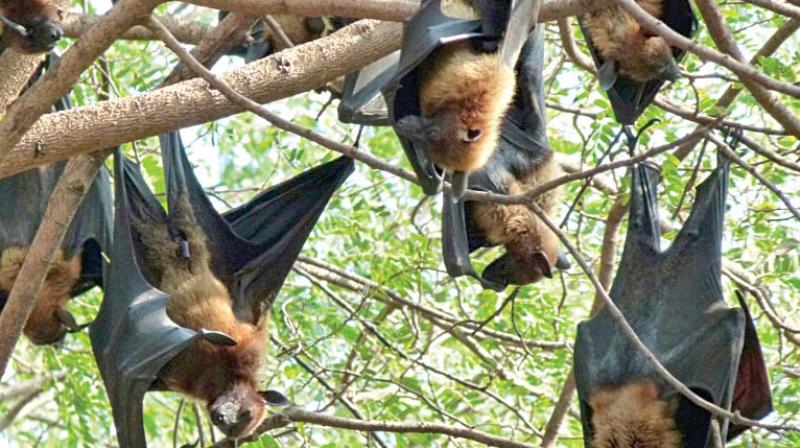Tabakad-Honnali can't stop batting for the bats

People of Tabakad Honnalli village near Hubballi revere bats to the extent of worshipping them. And believe it or not, they have strong reasons to do this, writes Vittal Shastri
Ever heard of people batting for bats, otherwise considered fearful creatures because of their nocturnal habits and their not so friendly nature when they fly into your face at night?
There are indeed people who revere bats to the extent of worshipping them like deities.
They live in Tabakad Honnalli in Kalghatagi taluk, Hubballi. They revere the bats to the extent of worshipping them like deities and believe it or not, have strong reasons to do this.
A few decades ago, all the bats deserted the village and took shelter in the banyan trees in nearby Hindasageri village. Later, a severe drought hit the village and people attributed their bad times to the desertion of these mammals.
They felt that luck has been transferred from their village, leading to failure of crops and spread of cattle diseases.
The villagers then performed a grand pooja to the banyan trees by visiting Hindasageri, held a mammoth procession by beating drums, playing trumpets and other musical instruments to invite the bats back.
They offered sarees and vermilion to the trees with a prayer to the bats to return to their hamlet as they believe these mammals are Goddess incarnate.
“The villagers were forced to sell cattle due lack of fodder and drinking water. Many people left in search of livelihood due to the drought. And lo! The bats came back soon after we offered prayers. Prosperity also returned to the village after good rainfall,” said 82-year-old Shantavva Patil, a villager and wife of former legislator Fakkiragouda Patil who had represented Kalghatagi Assembly constituency.
It could be because of this strange reason that the villagers are never scared of the screeching of the bats and even consider it auspicious to hear the sound before resuming their agricultural activity early morning.
Unlike many of us who dread to see a bat at night hanging from a nearby tree. Though many in North Karnataka considers bats in their house a bad omen, these mammals are the most revered creatures for people in Tabakad Honnalli. Situated just 40 km from Hubballi town, the little hamlet has a 6,000 plus population.
Thousands of bats hung upside down from the hollow tamarind trees throughout the day and greet anyone who enters the village. Interestingly, the unusual scene is restricted to only this village. The bats leave the village at dusk in search of food in far-flung areas and return at 5 am with a beautiful lake adjacent to their roosting place providing a conducive atmosphere. They fly nearly 100 km to Hubball-Dharwad, Mundagod and Haliyal to eat guava, banana, flowers, insects and other fruits.
“Usually, people realise it is the crack of dawn when the rooster crows. But our day starts only after listening to the chirping bats once they return to the village after searching for food through the night. We worship these creatures by performing pooja every month at the small temple of the goddess built below the tamarind trees which are its roosting places”, said 62-year-old villager, Mahadevappa Uppar. The villagers claim that even the bat faeces is useful as a medicine to protect their children.
They collect the droppings from trees and smear it on the heads of children, mixed with coconut oil if they are not healthy and later, bathe their babies.
They believe that this will cure all ailments. “I used to apply bat faeces on the head of all my four children when they had fever. This keeps diseases at bay if we apply it twice a week. We consider it a good omen if a bat defecates on us while we pass through the street. For us, bats are a good omen,” said 58-year-old Yallamma Uppar.
However, Karnataka University zoology professor Laxmi Inamdar said that bat faeces should not be applied on the hair or any part of the body and if it is a traditional practice, it has no scientific basis.
People here even believe that the bats have the ability to foretell a death in any family. If the bats fly over a house during day time, the villagers presume that a death will occur in that family.
“No murders or violence has occurred in our village after the bats returned from the adjacent village. People of all castes live in harmony,” village elder Basappa Pavadi said.
Some miscreants tried to kill these bats to draw its blood which is reportedly used to treat patients suffering from paralysis attacks.
However, the villagers managed to protect the mammals by sending them away. There are people who have offered hefty amounts to get bat blood, but the villagers have vehemently refused to fall prey to these inducements as they believe that causing any harm to the bats will prove to be the death-knell for the entire village.

